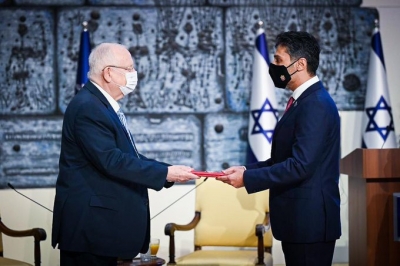1st UAE ambassador arrives in Israel
By IANS | Published: March 2, 2021 01:06 PM2021-03-02T13:06:03+5:302021-03-02T13:20:17+5:30
Tel Aviv, March 2 Mohamed Mahmoud Al Khaja, the first ever Ambassador of the United Arab Emirates (UAE) ...

1st UAE ambassador arrives in Israel
Tel Aviv, March 2 Mohamed Mahmoud Al Khaja, the first ever Ambassador of the United Arab Emirates (UAE) to Israel, has arrived to begin his term, about six months after the two countries established official ties.
Al Khaja, former chief of staff to the UAE Foreign Minister, presented his credentials to Israeli President Reuven Rivlin in an official ceremony on Monday at the latter's residence, reports Xinhua news agency.
"The Ambassador presented his letter of credence on assuming his role as ambassador to the State of Israel in an official ceremony," the President's office said in a statement.
"This will be your most important mission to welcome the hands reaching out to you, to meet the Israeli people, and to get to know them up close," the statement quoted Rivlin as saying Al Khaja.
Al Khaja said his country and Israel share a common vision of "tolerance and cooperation".
He also met Israeli Foreign Minister Gabi Ashkenazi and pledged to build up bilateral ties and enhance cooperation in various fields.
The location for the UAE embassy in Israel is yet to be decided.
The envoy will stay in Israel for three days before returning to the UAE until a permanent location is found.
Israel's envoy to the UAE, Eitan Na'eh, arrived in Abu Dhabi on January 24 and has begun working as Charge d'affaires until a permanent Ambassador is appointed.
UAE was the first Arab country to normalise relations with Israel.
Morocco, Bahrain and Sudan followed suit.
Since the signing of Abraham Accord in September 15, 2020, in Washington, several delegations from the UAE and Israel have met to sign bilateral agreements on trade and investment, tourism, direct flights, security, telecommunications, technology, energy, healthcare, culture, the environment, the establishment of reciprocal embassies, and other areas of mutual benefit.
( With inputs from IANS )
Disclaimer: This post has been auto-published from an agency feed without any modifications to the text and has not been reviewed by an editor
Open in app